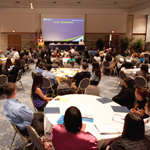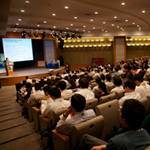Male doctors in their 60s are most likely to play golf, and surgeons make the best golfers
In the US, most doctors who play golf are men, particularly those in the surgical specialities, finds a study in the Christmas issue of The BMJ.
It has been a long accepted stereotype that doctors spend much of their leisure time playing golf, suggest the authors, but the limited existing studies have focused mainly on the sport’s health benefits.
So researchers in the US set out to analyse golf habits among doctors, looking at differences in golf practices across specialities and between males and females, and which specialities produce the best golfers.
The study looked at the golfing habits of more than 40,000 US doctors based on two databases: the Doximity physician database and the Golf Handicap and Information Network database.
The Golf Handicap and Information Network is widely used by amateur golfers to log their scores and the Doximity database includes information on nearly all US doctors, such as their age, sex, and specialty.
For each doctor in the Doximity database, the researchers cross-referenced the information with the Gold Handicap and Information Network database to find out doctors’ handicaps and the number of games logged in the previous 6 months.
The study found that at least 4% of doctors play golf, with male doctors and surgical specialists spending the most time on the golf course.
Male doctors between 61-70 were most likely to play golf, and female doctors aged 31-35 were least likely to play.
But it is unclear whether this is a generational preference or a matter of the amount of free time available at different points in one’s career, write the authors.
Interestingly, only 1.3% of female doctors were golfers, making up just 10.5% of overall doctors who play golf.
Fewer than 3% of doctors in specialities played golf, such as internal medicine and infectious disease.
Specialties with more golfers, such as orthopedic surgery, urology and plastic surgery, and golfers who played more often had lower handicaps.
A golfer’s handicap is an indication of their skill level – the lower the handicap the better the golfer’s performance, explain the authors.
They discuss that handicaps among doctors varied substantially across the specialities.
Doctors who specialised in thoracic surgery, vascular surgery and orthopedic surgery had the best handicaps, being about 15% lower than doctors in endocrinology, dermatology and oncology.
With an average handicap of 16 overall, 15 for male doctors and 25 for female, the authors suggest that generally doctors were “at best, average golfers”, compared to professionals whose handicaps usually stand at 0 or lower.
This is an observational study, and was only focused on doctors in the US, therefore no firm conclusions can be made about golfing habits across all doctors.
In addition, there were numerous other limitations, including the fact that not all doctors who played golf would report personal statistics to the Golf Handicap and Information Network, and the authors suggest that “it is likely that more physicians play golf than estimated by our study”.
However, the study is based on a database which is widely used by amateur golfers, and 5.5% of male physicians report golf statistics to it, the authors add.
Future research into the association between golfing and patient outcomes, cost of care, and physician well-being is needed, they conclude.
Golf is most common among older male surgeons























